 With a fearful eye on Skype’s runaway success, Microsoft has joined the stampede to offer Internet-based telephony services by announcing a cut price, pre-paid PC-to-phone service, the result of a deal with the US telecommunications group, MCI.
With a fearful eye on Skype’s runaway success, Microsoft has joined the stampede to offer Internet-based telephony services by announcing a cut price, pre-paid PC-to-phone service, the result of a deal with the US telecommunications group, MCI.
The new service, combining MCI’s existing VoIP network service with Microsoft’s software, will regale under the less-than-snappy title of “MCI Web Calling for Windows Live Call” and is expected to launch in the first half of 2006.
The service will work through Windows Live Messenger, the soon-come successor to the MSN Messenger instant messaging service which currently boasts more than 185m active global users. It is thought that VoIP technology from recent Microsoft purchase, Teleo, will be used.
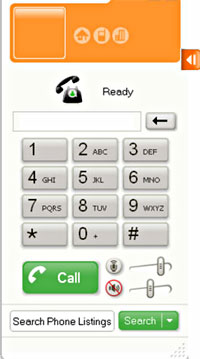 In recent months, Google, Yahoo! and eBay’s Skype unit have all chipped in with their own cheapo PC-to-phone VoIP (Voice over Internet Protocol) services.
In recent months, Google, Yahoo! and eBay’s Skype unit have all chipped in with their own cheapo PC-to-phone VoIP (Voice over Internet Protocol) services.
By teaming up with a powerful ally (PCI is being acquired Verizon Communications), Microsoft are clearly hoping to shove their hefty size nines into the lucrative VoIP market before it runs away from them.
The calling costs of the Microsoft/MCI service will be comparable to their rivals, with users paying 2.3 cents per minute for calls within the US and between the US and other countries.
Yahoo’s service – bundled in with its IM service – is expected to charge 1 cent per minute to call a phone in the United States from a PC outside the country, with calls to about 30 other countries costing about 2 cents per minute.
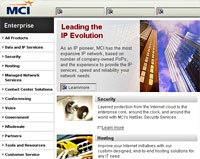 Similarly, Skype, the current big boys of the PC-to-PC VoIP market, are offering calls for about 2 cents a minute from a PC to a phone in the US other countries.
Similarly, Skype, the current big boys of the PC-to-PC VoIP market, are offering calls for about 2 cents a minute from a PC to a phone in the US other countries.
Taking a leaf out of Skype’s service, Microsoft/MCI customers will also be able to purchase prepaid calling cards and make calls to ordinary fixed line an mobile phones from entries in their contact list.
The service is currently undergoing limited beta trials in the US, with France, Germany, Spain, and the United Kingdom trials expected shortly.
We’ll have to wait until the product officially launches to get the final details and pricing schemes, although Microsoft and MCI have already stated that users will eventually be able to call more than 220 countries.
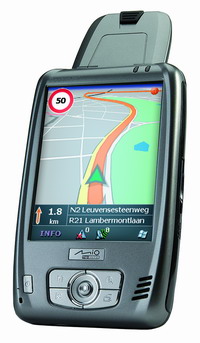 Out just in time for overgrown boys to stick it on their Santa wish list, Mio Technology have announced their new Mio A201 integrated GPS model.
Out just in time for overgrown boys to stick it on their Santa wish list, Mio Technology have announced their new Mio A201 integrated GPS model.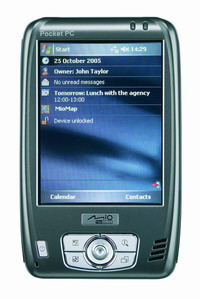 Mio are promoting the device as a ‘go anywhere’ portable sat-nav device which can be used for drivers, mountain bikes or walkers ambling through the countryside.
Mio are promoting the device as a ‘go anywhere’ portable sat-nav device which can be used for drivers, mountain bikes or walkers ambling through the countryside.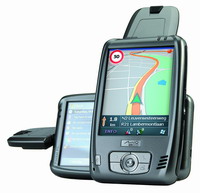 There’s the usual Outlook synchronisation options available, and we rather liked the new Compass Mode designed for navigating off road on foot or on a bicycle.
There’s the usual Outlook synchronisation options available, and we rather liked the new Compass Mode designed for navigating off road on foot or on a bicycle. In the week that BT and Sky both saw their triple play offerings potentially trumped by a possible NTL/Virgin ‘quadruple play’, BT chose to release details of its upcoming content deals with BBC Worldwide, Paramount and Warner Music Group.
In the week that BT and Sky both saw their triple play offerings potentially trumped by a possible NTL/Virgin ‘quadruple play’, BT chose to release details of its upcoming content deals with BBC Worldwide, Paramount and Warner Music Group. Against a backdrop of whispered rumours of delays with Microsoft’s IPTV Edition, the BT service is slated for launch next year.
Against a backdrop of whispered rumours of delays with Microsoft’s IPTV Edition, the BT service is slated for launch next year. 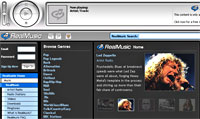 Real have announced the launch of its new online music service, imaginatively called, err, RealMusic.
Real have announced the launch of its new online music service, imaginatively called, err, RealMusic. RealMusic will be creating a chart of the top ranking tracks and ringtones created, submitted, and rated by users, with an editorial team producing content and commentary on artists, music releases and videos.
RealMusic will be creating a chart of the top ranking tracks and ringtones created, submitted, and rated by users, with an editorial team producing content and commentary on artists, music releases and videos. “This demonstrates that there is a strong demand for services that mix the way in which consumers access music, from downloading the latest chart hits and ringtones to sharing tracks from unsigned bands. RealMusic gives music enthusiasts all these options as well as the opportunity to effortlessly discover music to suit their mood,” he continued.
“This demonstrates that there is a strong demand for services that mix the way in which consumers access music, from downloading the latest chart hits and ringtones to sharing tracks from unsigned bands. RealMusic gives music enthusiasts all these options as well as the opportunity to effortlessly discover music to suit their mood,” he continued.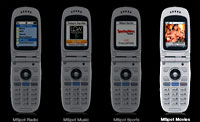 Sprint and MSpot, have announced the launch of MSpot Movies, a new service which streams mobile-optimised feature films to mobile phones.
Sprint and MSpot, have announced the launch of MSpot Movies, a new service which streams mobile-optimised feature films to mobile phones.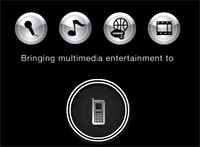 The streaming content will be cut up into ‘chapters’ (short segments optimised for a mobile audience) and will also include music concerts and stand-up comedy specials.
The streaming content will be cut up into ‘chapters’ (short segments optimised for a mobile audience) and will also include music concerts and stand-up comedy specials. Although there’s no denying that mobile video is set to grow – Strategy Analytics reckon they’ll be 150 million viewers by 2008 – we really can’t raise much enthusiasm at the prospect of burning up our bandwidth by watching a selection of crap movies on a tiny screen in 5 minute chunks.
Although there’s no denying that mobile video is set to grow – Strategy Analytics reckon they’ll be 150 million viewers by 2008 – we really can’t raise much enthusiasm at the prospect of burning up our bandwidth by watching a selection of crap movies on a tiny screen in 5 minute chunks. A UK company is introducing a “StealthText” service which sends self-destructing mobile phone text messages.
A UK company is introducing a “StealthText” service which sends self-destructing mobile phone text messages. “The ability to send a self-destruct message has massive benefits for people from all walks of life, from everyday mobile users, through to celebrities and business people, but this is just the start,” said Staellium CEO Carole Barnum, adding that the company intends to extend the service to include self-destructing email, voice and picture messages in spring 2006.
“The ability to send a self-destruct message has massive benefits for people from all walks of life, from everyday mobile users, through to celebrities and business people, but this is just the start,” said Staellium CEO Carole Barnum, adding that the company intends to extend the service to include self-destructing email, voice and picture messages in spring 2006.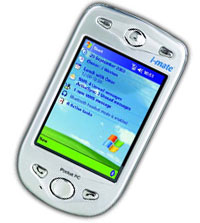 Pocket PC software company SPB ran a survey of its users during November 2005, and discovered that a staggering 96% of those taking part were blokes.
Pocket PC software company SPB ran a survey of its users during November 2005, and discovered that a staggering 96% of those taking part were blokes. As for accessories, memory cards, unsurprisingly, were the essential purchase for 85% of respondents, with 69% forking out for screen protectors.
As for accessories, memory cards, unsurprisingly, were the essential purchase for 85% of respondents, with 69% forking out for screen protectors. 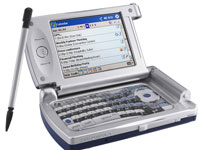 The vast majority of Pocket PC users (85%) connect to the internet with their machines, with 72% browsing the web, 65% checking email and 35% using instant messaging.
The vast majority of Pocket PC users (85%) connect to the internet with their machines, with 72% browsing the web, 65% checking email and 35% using instant messaging. A US federal appeals court has upheld the mammoth $22,500 (£12,760, €18,930) fine slapped on a 29 year old Chicago mother caught illegally distributing songs over the Internet.
A US federal appeals court has upheld the mammoth $22,500 (£12,760, €18,930) fine slapped on a 29 year old Chicago mother caught illegally distributing songs over the Internet. After Ms Gonzalez rejected an earlier proposed settlement from music companies of about $3,500 (£1,950 €2,950), a federal judge later filed a summary judgement ordering her to shell out $750 (£425) for each of 30 songs she was accused of illegally distributing over the Internet.
After Ms Gonzalez rejected an earlier proposed settlement from music companies of about $3,500 (£1,950 €2,950), a federal judge later filed a summary judgement ordering her to shell out $750 (£425) for each of 30 songs she was accused of illegally distributing over the Internet. Ms Gonzalez’s case was part of first wave of civil lawsuits filed by record companies and their trade organisation, the Recording Industry Association of America (RIAA), back in September 2003.
Ms Gonzalez’s case was part of first wave of civil lawsuits filed by record companies and their trade organisation, the Recording Industry Association of America (RIAA), back in September 2003.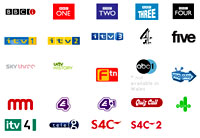 Ofcom has published its Digital Television Update for the third quarter of 2005, revealing that two thirds of UK households now watch digital television.
Ofcom has published its Digital Television Update for the third quarter of 2005, revealing that two thirds of UK households now watch digital television. The number of households with Freeview as their only source of digital television viewing was estimated at 5,775,000 – up by 600,000 homes during the quarter.
The number of households with Freeview as their only source of digital television viewing was estimated at 5,775,000 – up by 600,000 homes during the quarter. 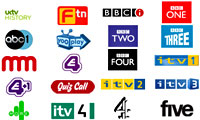 Digital cable subscribers now account for more than 2.6 million of the total cable television homes, increasing by more than 43,300 in the quarter, while subscriptions to analogue and digital cable television decreased slightly to just below 3.3 million in the quarter (due to a fall in analogue cable subscribers outweighing the increase in digital cable subscriptions).
Digital cable subscribers now account for more than 2.6 million of the total cable television homes, increasing by more than 43,300 in the quarter, while subscriptions to analogue and digital cable television decreased slightly to just below 3.3 million in the quarter (due to a fall in analogue cable subscribers outweighing the increase in digital cable subscriptions). When we saw MSI’s feature packed StarCam 370i knocking out for a mere £15 online ($26, €22), we thought it would make an ideal replacement for our elderly (and somewhat battle-weary) Sony cam, currently gazing out over the delights of Brixton.
When we saw MSI’s feature packed StarCam 370i knocking out for a mere £15 online ($26, €22), we thought it would make an ideal replacement for our elderly (and somewhat battle-weary) Sony cam, currently gazing out over the delights of Brixton. A rudimentary software control panel lets users fiddle about with image/video parameters (gamma, brightness, contrast etc), and budding Jean-Luc Godard’s can select the black and white option for arty scenes.
A rudimentary software control panel lets users fiddle about with image/video parameters (gamma, brightness, contrast etc), and budding Jean-Luc Godard’s can select the black and white option for arty scenes. The cam also features a built in microphone which was, as you might expect, fairly basic and lo-fi, but good enough for Internet calls.
The cam also features a built in microphone which was, as you might expect, fairly basic and lo-fi, but good enough for Internet calls. We can, however, recommend it for anyone looking for a basic, cheap as chips Webcam for video chats with friends and relatives.
We can, however, recommend it for anyone looking for a basic, cheap as chips Webcam for video chats with friends and relatives.